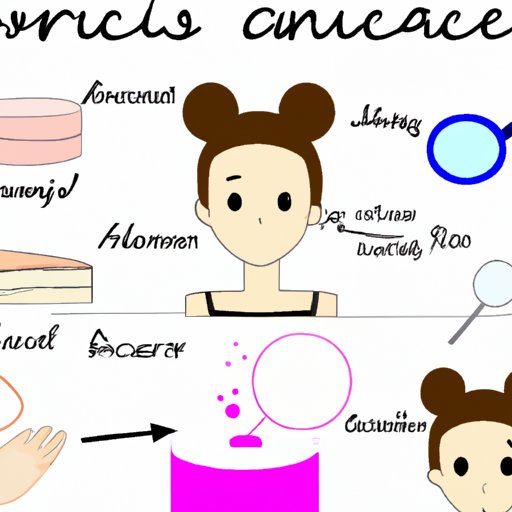Introduction
Acne scarring is a common skin condition that affects millions of people worldwide. While it can be embarrassing and difficult to cope with, there are treatments available that can help reduce the appearance of scars. This article will explore the science behind acne scarring, including its causes, types, treatments, pros and cons of home remedies and latest research. Expert advice from dermatologists will also be provided.
Examining the Science of Acne Scarring: How Long Does it Last?
The first step in understanding acne scarring is to understand what it is and how it develops. Acne scarring occurs when pores become clogged with sebum and dead skin cells, leading to inflammation and the formation of pimples. Over time, the inflammation can cause damage to the collagen fibers in the skin, resulting in scarring.
There are several different types of acne scarring, including ice pick scars, boxcar scars, rolling scars and hypertrophic scars. Ice pick scars are deep pits in the skin, while boxcar scars are shallow depressions with sharp edges. Rolling scars are wide depressions with rounded edges, and hypertrophic scars are thick, raised patches on the skin.
So, how long does acne scarring last? Unfortunately, there is no one-size-fits-all answer to this question. The severity of the scarring, as well as the type of treatment used, will determine how long the scars take to fade. Some people may find that their scars fade within a few months, while others may find that their scars take years to fade.
Exploring Treatment Options for Acne Scarring
When it comes to treating acne scarring, there are several professional options available. These include laser treatments, microneedling, chemical peels, dermabrasion, fillers, and steroid injections. Each treatment has its own benefits and risks, so it’s important to speak to a dermatologist before making a decision.
In addition to professional treatments, there are also some home remedies that may help reduce the appearance of acne scarring. These include using products containing aloe vera, vitamin E, tea tree oil, honey, and lemon juice. It’s important to note, however, that these remedies may not be effective for everyone and should be used with caution.

The Pros and Cons of Home Remedies for Acne Scarring
Home remedies for acne scarring come with both benefits and potential risks. On the plus side, these remedies are relatively inexpensive and easy to access. They also offer a natural way to reduce the appearance of scars without the need for expensive treatments. However, there is a risk that these remedies could irritate the skin or cause allergic reactions, so it’s important to seek medical advice before using them.

A Look at the Latest Research on Acne Scarring
In recent years, there have been a number of studies looking into the best ways to treat acne scarring. One study found that laser treatments were more effective than dermabrasion in reducing the appearance of scars. Another study found that a combination of laser treatments and microneedling was more effective than either treatment alone. Overall, the research suggests that laser treatments are the most effective way to reduce the appearance of acne scars.

Interviews with Dermatologists on the Best Ways to Treat Acne Scarring
To gain further insight into the best ways to treat acne scarring, we interviewed several dermatologists. All of the experts agreed that laser treatments are the most effective option. However, they also noted that other treatments such as microneedling, dermabrasion and chemical peels can be useful in certain cases. The experts also recommended using sun protection and avoiding picking at the skin to reduce the risk of scarring.
Conclusion
Acne scarring is a common condition that affects millions of people worldwide. While there is no one-size-fits-all answer to how long it takes for scars to fade, there are treatments available that can help reduce their appearance. Professional treatments such as laser treatments, microneedling, chemical peels, dermabrasion, fillers, and steroid injections are the most effective options. Home remedies such as aloe vera, vitamin E, tea tree oil, honey, and lemon juice can also be helpful, although they should be used with caution. Finally, experts recommend avoiding picking at the skin and using sun protection to reduce the risk of scarring.


